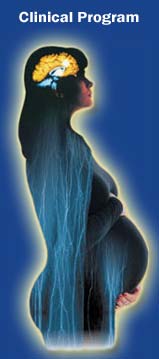|
The Emory Womens’ Mental Health Program was originally founded in 1991 as the Postpartum Mood Disorders Program.
The program was founded and directed by Zachary N. Stowe, M.D., a leader in the field of women's mental health.
As the referrals for postpartum illness grew it became obvious that many of these women experienced symptoms during
pregnancy, experienced more depression and anxiety with their menstrual cycles, and worried that such symptoms
would return after subsequent pregnancies. The original program expanded to include women with infertility issues
and endometriosis. Our clinical and research collaborations with colleagues in Psychology, Neurology, and OB/Gyn
warranted changing the program name in 2001. The goals of the clinical program are best exemplified by the
following axioms:
"Healthy women have the best chance of having a healthy baby"
"Pregnant and nursing women should not be emotionally punished or allowed to suffer for being pregnant or
nursing"
It is a common misconception that pregnancy represents a time of emotional well-being for all women. The rates
and severity of most depressive and anxiety disorders do not decrease during pregnancy. Most of the information
that is available to women gives the impression that pregnancy progresses without complication, pregnant
women seldom need medications, delivery is uncomplicated, all babies are cosmetically perfect, and that
breastfeeding is easy. These 'perfect childbirth experiences' account for less than 15% of all pregnancies.
Unfortunately, these misconceptions lead to a greater sense of failure for many new mothers. Similarly,
the only time that postpartum emotional disturbances are discussed in the news is when something terrible
has happened. Very, very few women with postpartum emotional disorders ever pose a threat to their to babies.
The major clinical focus of the program is the identification and treatment planning for women with emotional
disorders as they progress through the childbearing years. The program offers comprehensive education, information,
and treatment planning for women with a history of psychiatric illness as they consider starting their families,
including women currently in infertility programs. We specialize in the identification and treatment of mental illness
during pregnancy and the postpartum period. The Emory Women's Mental Health Program is one of the few university
centers conducting research in these areas. The combination of clinical research with ongoing clinical treatment
planning provides access to the latest information. Evaluations include up to date information, articles published
in major journals, and comprehensive treatment planning tailored to the individual. The typical situations that are
our specialty include:
|
Women with a history of psychiatric illness that are considering
starting their families. This includes women that are taking psychiatric medications and/or anti-epileptic
drugs or may have recently stopped medications in preparation for pregnancy.
|
|
The normal changes of pregnancy often overlap with many of
the symptoms of psychiatric illness. It is often difficult to tease out what is pregnancy and what is not
- experience in this area is of utmost importance in evaluations.
|
|
Women with a history of postpartum depression or other psychiatric history are
at increased risk to have significant emotional symptoms after childbirth. Not all prevention strategies
include medications, and knowledge about medications and other interventions in breastfeeding provide these
women with the best opportunity to have the postpartum experience they desire.
|
|
Postpartum depression has been documented since the time of
Hippocrates, yet many women have received limited information about postpartum depression before they deliver.
Effective, safe, and expedient treatment of postpartum women have been the cornerstone of the Program since its
inception.
|
|


